MASSACRE REMEMBERED
Families of slain Marikana mine workers reflect on decade of ‘betrayal’: ‘It feels like our pain does not matter’
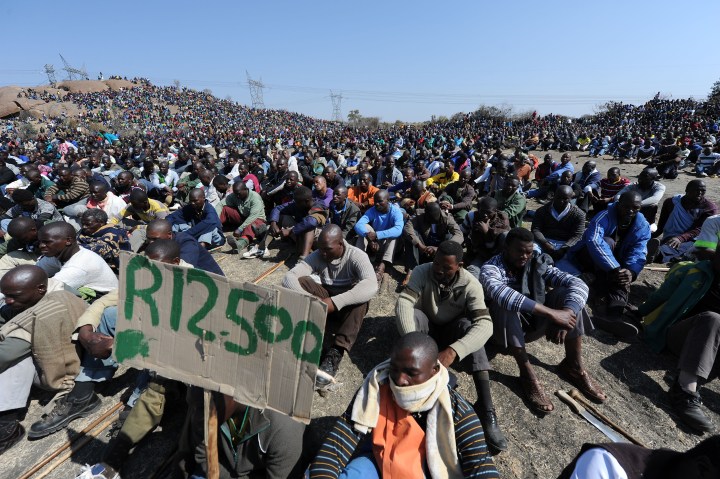
As the country prepares to remember that horrific day 10 years ago, the victims’ families tell Daily Maverick of their sense of betrayal and justice not served, giving their lingering grief an acute edge.
On the eve of the 10th anniversary of the Marikana massacre, livestock graze near the koppie where the mine workers were gunned down. Metres away, shacks are huddled together in groups, most of them made from rusted corrugated iron and some surrounded by sewage water.
There are no formal roads but a truck offloading materials is evidence of a project to build one.
Residents and foreigners run a number of informal businesses, from spaza shops to traditional pharmacies. Many people hang around on the streets, and they are reluctant to speak to the media. Some are heard suggesting that their plight is being made a mockery in the run-up to the annual commemoration of the massacre, on 16 August.
The mine owned by Lonmin at the time was sold and acquired by Sibanye-Stillwater in June 2019. The new owners admit they “inherited the legacy of the Marikana massacre”.
Victim
Palesa Lehota is one of many children whose lives completely changed when her father, Josphin Lehota, was gunned down during the deadly platinum mine wage strike alongside 33 other miners in Marikana 10 years ago.
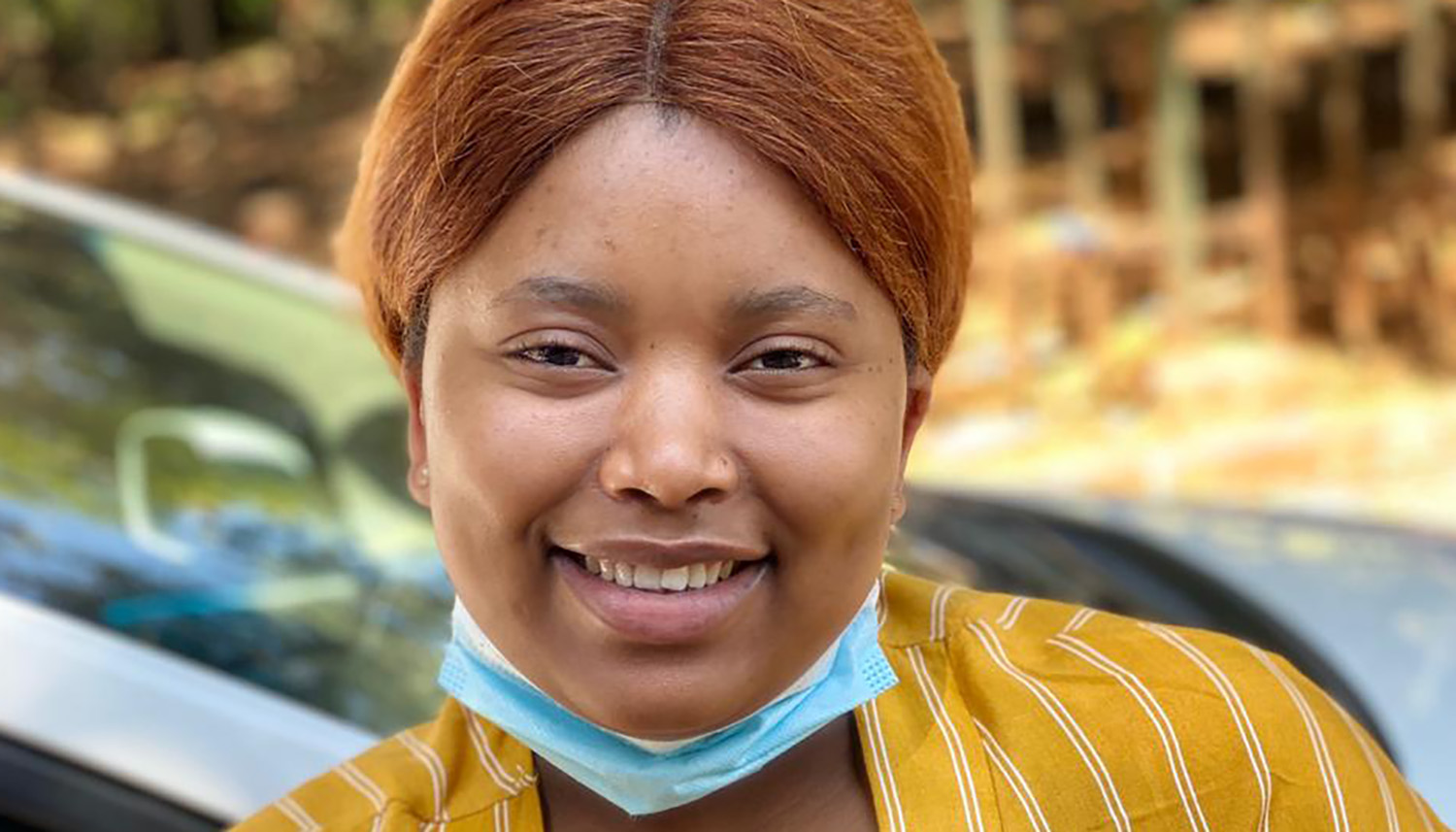
Palesa Lehota is one of many children whose lives completely changed when her father, Josphin Lehota, was gunned down during the platinum mine wage strike at Marikana 10 years ago. (Photo: Supplied)
While the tragedy struck when she was 15, she still recalls the brutal images on television that made global headlines, as she hoped her father was among the 112 who were injured.
For a long time she questioned her sense of belonging, bearing the pain of losing her father in such a cruel manner, with no justice served.
“It still hurts, but we are trying to move on by the grace of God,” she told Daily Maverick.
That pain is more acute as the anniversary approaches, as nobody has been held to account and the families are expected to carry on as usual, said Lehota, whose youngest brother, who is 12, will be expected to be in school when the country commemorates the day on Tuesday.
“Perhaps it would have been better if we were allowed to stay at home and grieve, but we are expected to carry on as per normal.”
Visit our Marikana anniversary page for more analysis and reflections.
It also does not help that President Cyril Ramaphosa – who was a non-executive director at Lonmin at the time – has not set foot in the area, she said.
“We have seen the President visit many families, even recently at Enyobeni. It feels like our pain does not matter; we are still questioning why he has never bothered to… or perhaps this thing was planned.”
Lehota and her five siblings now rely on their mother, Zameka Nungu, to survive. She is employed as a cleaner at the Sibanye-Stillwater mine.
The Farlam Commission of Inquiry, established by former president Jacob Zuma to investigate the massacre, made a string of recommendations including the provision of financial compensation by the state to the families.
Lehota did not know whether this had been paid, but the Association of Mineworkers and Construction Union (Amcu) confirmed that some families had received payment.
“No amount of money can replace my father. He is priceless. But I think an apology would help all of us have closure,” she said.
Ten years
“A decade of betrayal,” is how Amcu president Joseph Mathunjwa described the years after the massacre.
This is because the people of the Nkaneng informal settlement continue to live in squalor, are unemployed and do not have access to decent housing, while those behind the massacre have not taken responsibility.
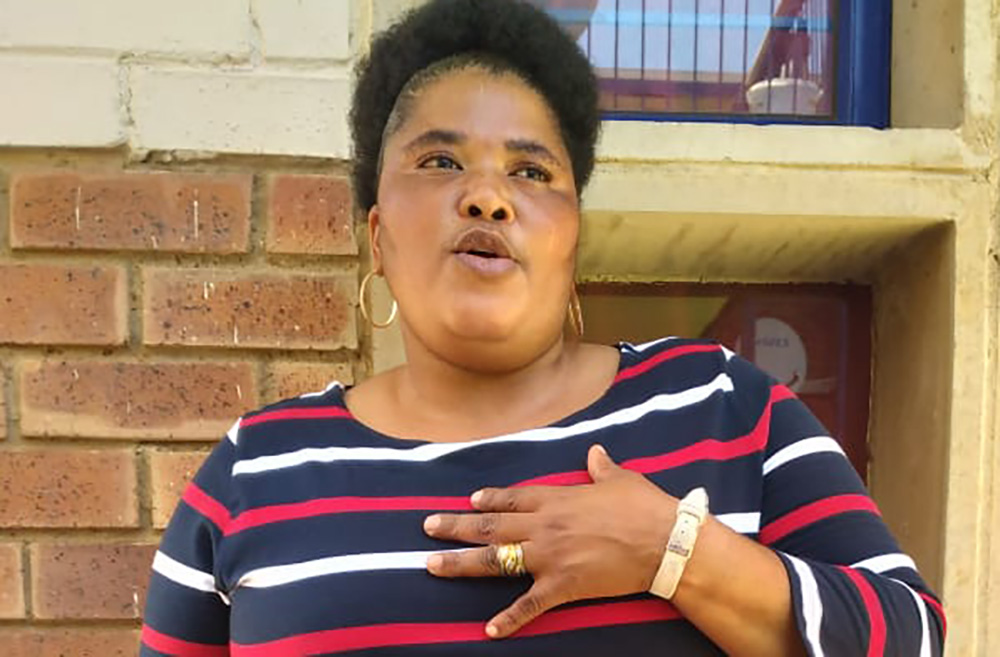
Zameka Nungu now looks after six children after her husband, Josphin Lehota, was killed in the Marikana massacre. She is employed as a cleaner at the mine. (Photo: Supplied)
Mathunjwa was critical of the mine’s exoneration by the Farlam Commission. “It is not possible because they are partners in crime.”
Mathunjwa says the union is still calling for the mine to financially compensate the deceased and injured workers’ families.
The mine says that although it was exonerated, it is committed to “acknowledging the tragic legacy, honouring all the affected lives”.
It had committed to “making amends by seeking and contributing to reparations for those who were and continue to be affected by the tragic events of 2012. We also look to the future and are committed to working with all stakeholders to build a better future for all in and around Marikana,” according to James Wellsted, executive vice-president of investor relations and corporate affairs at Sibanye-Stillwater.
Mathunjwa, who was among the striking miners, recalled how his life was spared by a phone call which forced him to move away from his protesting colleagues. Moments later, police opened fire.
He says he has not healed from the graphic images of his co-workers.
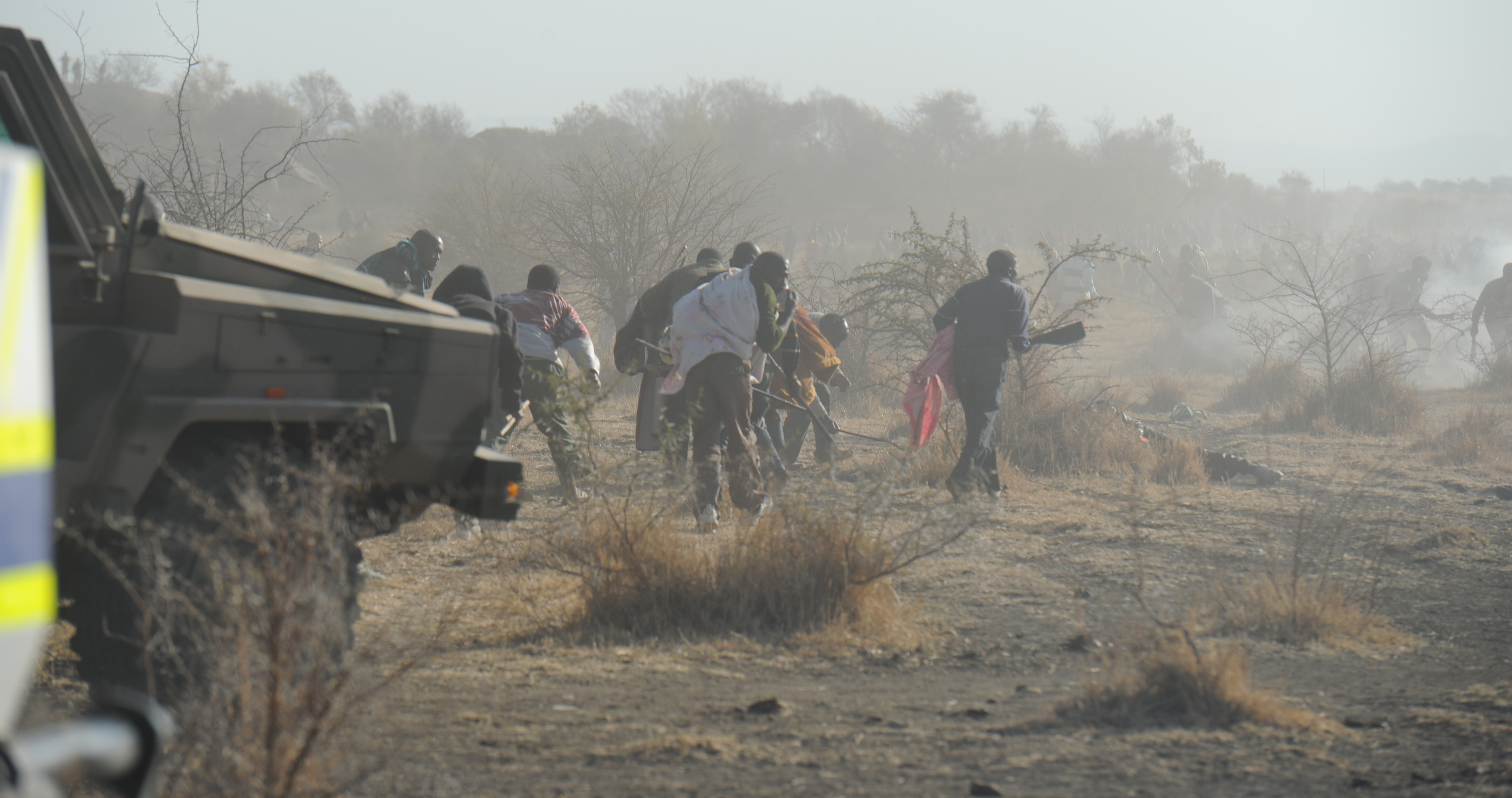
Miners flee as police fire live ammunition and tear gas near the Lonmin mine in Rustenburg, North West, on 16 August 2012. (Photo: Felix Dlangamandla)
“Some of them were shot execution style. You should’ve seen how some of their heads were shot at, there was so much blood… There is no healing from that. Even speaking about it now hurts,” he said, holding back tears.
Mathunjwa says the massacre should have been a wake-up call for democratic South Africans to say: “It’s not yet Uhuru.”
‘So much blood’
For Phalang Phori, a miner who was present during the strike, the anniversary of the massacre is a painful reminder.
“So much blood was spilled and for what? Nothing, as you can see that we still live in shacks, we don’t have access to decent houses, don’t even have showers.”
The father of three suggested that their fight for a better life had not paid off, 10 years later. “We are still poor. They have done nothing for us. Nothing in our lives shows the important work that we do at the mine.”
Phori said he too thought the mine and the government would have done justice for the community of Marikana. To his dismay, instead the mine is dragging its feet on annual increases, which were supposed to be paid in July.
Another miner, Sandile Mani, echoed his sentiments. He lives in a rented room with his wife, Sisipho, and their young son.
Mani, who was employed on a contract basis at the time, said the mine and government have failed to keep their promises. He slammed the government for only showing up in the area in the build-up to the commemoration.
“We were promised many things, none of which were fulfilled. People (the government) do come to visit and make all sorts of promises every year when it’s close to commemoration, but after the 16th they go back to their lives.”
As an example, Mani cited two construction projects which he said started two weeks ago. “You see they are trying to fix things because of the 16th; we are not even shocked.”
Annabel Chauke, a resident in the area for 16 years, shared her frustration with unfilled promises by government officials.
She recalled how, when the massacre occurred less than 2km from her two-roomed shack, they had to run for their lives – and how they lost friends and neighbours.
“Government is not even trying, we are on our own,” she added.
The residents and miners are, however, grateful to Mathunjwa for being their voice and ensuring the families of the 34 miners are taken care of, sometimes out of his own pocket.
He said the union had taken responsibility and built decent houses in a bid to restore the deceased workers’ dignity.
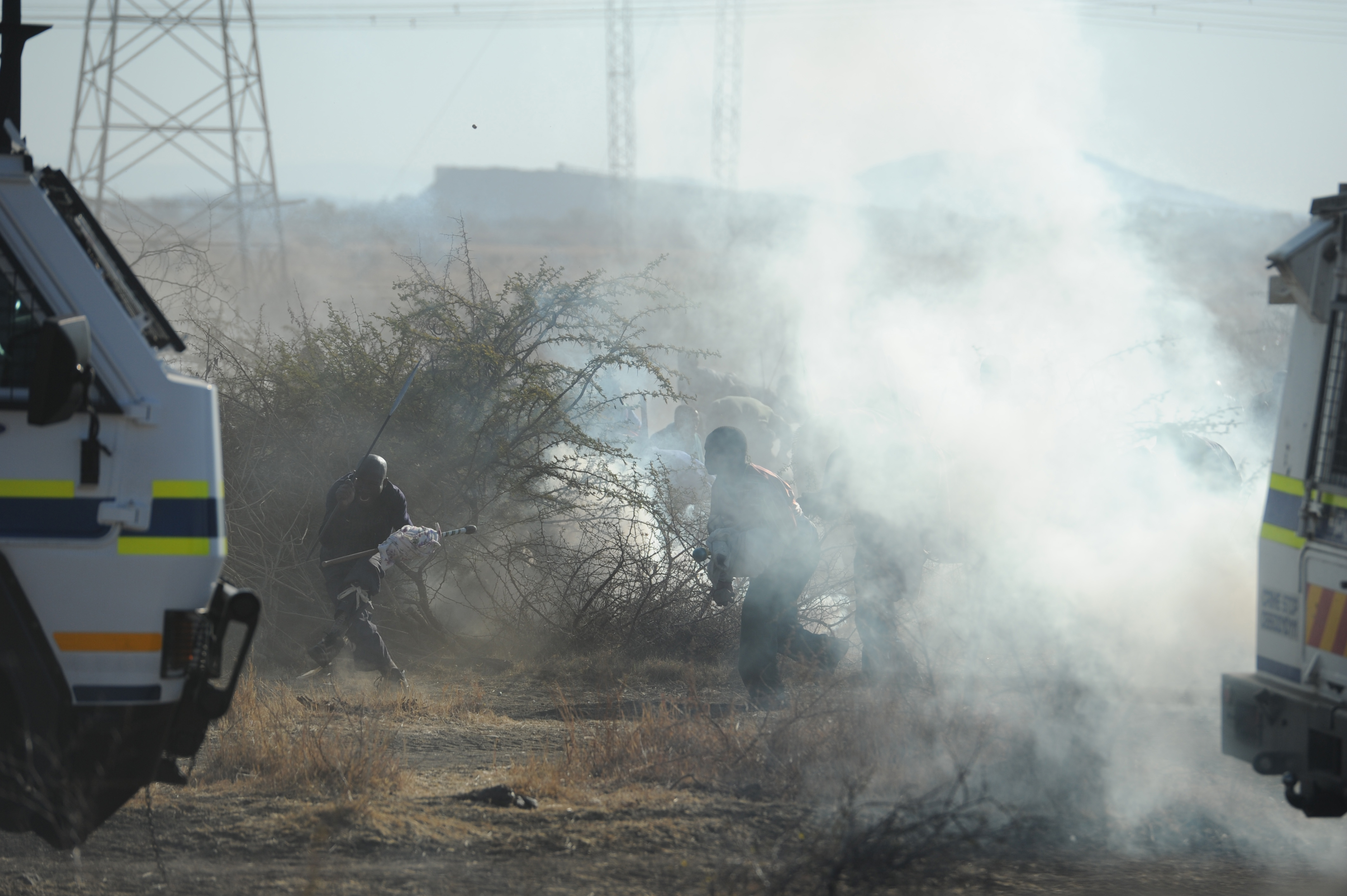
Police use live ammunition and tear gas on mine workers outside the Nkaneng informal settlement near the Lonmin mine in Rustenburg, North West, on 16 August 2012. (Photo: Felix Dlangamandla)
“They left their homeland for a better life, not knowing that they would die of bullets. Their desire was to build good houses for their families, so we took it upon ourselves to approach the national council of Amcu to plead with them to make money available for us to build them houses, [and] they agreed.
“We gave those families who were robbed of their dignity by Lonmin and our democratic government whom we voted for,” said Mathunjwa.
Wellsted confirmed that the union contributed 28 houses while the mine had handed over eight and another eight are coming.
In a media briefing on Wednesday, the government said it was hoping to finalise the remaining two dozen reparation claims out of a total 370 Marikana-related litigations which must be settled before the month is up.
“It is regrettable that in fact we could still stand here and talk about matters that in fact had occurred 10 years ago,” said Solicitor-General Fhedzisani Pandelani.
“The matters that I am referring to would relate in the main to matters where there were personal injuries, where people had to be sent for medical examination and so forth. All those matters were set down by the High Court in Pretoria and the directive was that all those matters should either be settled or alternatively they would have to serve before court before the end of August,” said Pandelani.
Mathunjwa was not optimistic about this as he confirmed that families were demanding R8-billion in compensation and for Ramaphosa to apologise in his personal capacity. DM


















 Become an Insider
Become an Insider
Comments - Please login in order to comment.